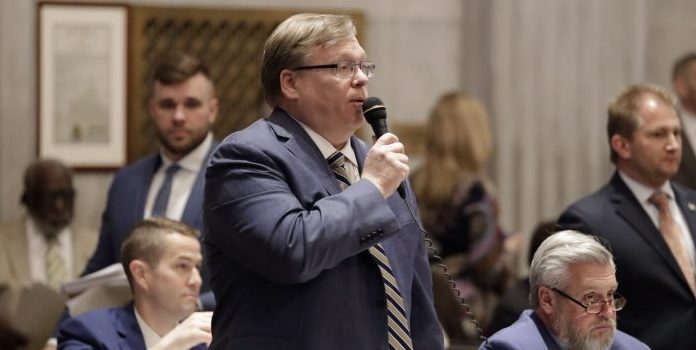(Headline USA) The American Civil Liberties Union filed a federal lawsuit Friday challenging Tennessee’s first-of-its-kind law that requires businesses and government facilities to post signs if they let transgender people use multiperson public bathrooms of their choice, seeking to block the requirement from taking effect on July 1.
The ACLU and its Tennessee chapter brought the lawsuit in Nashville on behalf of Bob Bernstein, owner of Fido restaurant in Nashville; and Kye Sayers, owner of the Sanctuary Performing Arts venue in Chattanooga, which was founded by members of the transgender community; and their corresponding businesses.
It names the state fire marshal, state codes enforcement director and two district attorneys as defendants.
With the threat of misdemeanor penalties, the law requires that the following sign be posted in bold, uppercase letters outside public multiperson bathrooms, locker rooms or changing rooms wherever transgender people are not prevented from using the facilities of their choice: “This facility maintains a policy of allowing the use of restrooms by either biological sex, regardless of the designation on the restroom.”
It’s one of five new Tennessee laws this year that have drawn backlash from LGBTQ advocates.
The lawsuit argues that the sign requirement infringes on the business owners’ First Amendment rights by requiring them to “communicate a misleading and controversial government-mandated message that they would not otherwise display.”
The lawsuit says the phrase “either biological sex” is ”offensive to transgender and intersex people because it asserts that transgender people are not the sex they know themselves to be and ignores the existence of intersex people.”
Both owners are concerned that their businesses’ accessibility to multiperson bathrooms will require them to post the signs, which they worry will offend people and drive some away from their businesses, the lawsuit says.
“Sanctuary was founded specifically to create a safe space for transgender and intersex people and their families in a state that can be unwelcoming to LGBTQ people,” Sayers said in a news release. “I am against posting offensive signs that stigmatize and deny the existence of transgender and intersex people at our center.”
The law’s sponsor, Republican Rep. Tim Rudd, has said the law isn’t discriminatory, noting it doesn’t limit businesses on which facilities they can let people use and includes a 30-day window to post signs after an entity is informed it’s not complying.
“It’s very shocking and a danger to people if they walk into a restroom that’s marked men or women, and the opposite sex is standing there, it could scare them, it could provoke violence,” Rudd said while lawmakers debated the requirement.
Samantha Fisher, spokesperson for Attorney General Herbert Slatery, said the office “will defend state law but cannot comment further on pending litigation.”
How the bathroom law will be enforced remains uncertain.
It carries a misdemeanor penalty punishable by up to six months in jail despite an assurance from Rudd during legislative debate that the version that ultimately passed “does not provide any fines or penalties at this point.”
Authorized enforcers under the relevant section of Tennessee law include “all state officials, now having jurisdiction or as directed by the governor,” the state fire marshal, local fire prevention or building officials, the fire department chief, some mayors, and county officials.
Last month, a spokesperson for Republican Gov. Bill Lee said about the law that “state laws must be upheld,” while the Department of Commerce and Insurance, which includes the fire marshal’s office, said it’s “still reviewing the legislation to determine the appropriate implementation.”
Earlier this month, Republican Senate Speaker Randy McNally told reporters he doesn’t think the requirement will be enforced.
“It’s my understanding initially that it didn’t contain a penalty,” McNally said. “I don’t think that individuals that don’t post a sign are going to be penalized. I think it’s like the signs about washing your hands as you come out of the bathroom. I don’t think it will be enforced.”
Nashville District Attorney Glenn Funk, a defendant named in the lawsuit, has said his office “will not promote hate” and won’t enforce the law.
Adapted from reporting by Associated Press.

